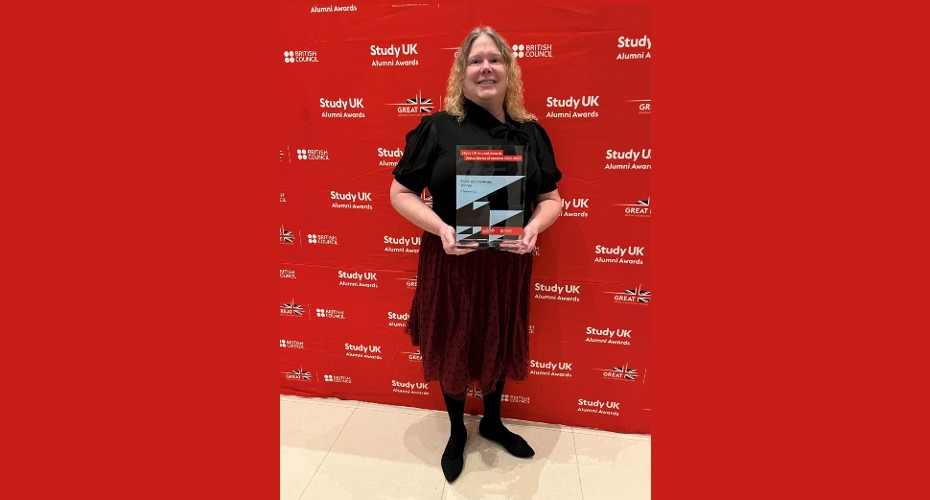We love celebrating the success of our talented alumni community and recently we’ve been delighted that some their achievements have been recognised as part of the Study UK Alumni Awards 2023/23 with alumna Michelle Szydlowski (MA Anthrozoology 2017, PhD Anthrozoology 2021) winning an award at a ceremony in Washington, D.C in February.
The British Council’s Study UK Alumni Awards 2022/23 take place in several countries and recognise outstanding international alumni, who studied in the UK for all, or part of, their degree. The winners and finalists of the prestigious awards are leaders in their respective fields and have used their experience of studying at a UK university to make positive contributions to their communities and professions.
On Friday 17 February, we had the pleasure of celebrating alumna Michelle who won the Social Action award that recognizes alumni who have made an exceptional contribution and commitment to creating positive change and improving the lives of others. She was presented with her award at the prestigious international event, was held at the British Embassy in Washington, D.C.
The British Council noted that Michelle received this award as she is “leading the way in redefining anthrozoology by ensuring that marginalized communities of human and non-human animals are equal participants in research and beneficiaries of conservation practices. She serves on the advisory board of a joint Nepalese/Belgian elephant-based NGO and is actively involved in environmental and humane education initiatives, one world/one health programs, and biodiversity preservation projects.”
We recently caught up with Michelle to find out more about her time studying at Exeter, how it felt to win this award, and her advice for those considering a career in anthrozoology or conservation.
Do you have any fond memories of your studies at Exeter and do you feel your degrees/time here helped you in your career?
MS: Being able to undertake my own research agenda, rather than have to do research based upon someone else’s project, was really a benefit to studying at Exeter. The friends I made during my program have lasted, and we still collaborate regularly on academic articles, projects, and presentations.
How did it feel to win the award and how did you celebrate?
MS: Winning this award was a total shock. Like most people, I suffer from imposter syndrome on a regular basis. Winning the award really made me feel like my work had reach beyond my mentees, my research participants, and my field sites. It was really a win for distance learners—being off-campus can be very isolating, which adds further difficulty to one’s studies. It is lovely to see distance learners represented in these awards.
As I had never visited Washington, DC, I took advantage of the days surrounding the awards ceremony to experience the museums and monuments. I am a major library and book lover, and so I celebrated the win with a visit to the Jefferson Library (Library of Congress). It was amazing!
What do you enjoy most about your work and what are your plans for the future?
MS: My favourite thing about any work is the opportunity to learn new things! I love getting to know students and research participants, experience different belief systems, and learn about everyone’s unique story. I have truly enjoyed getting to build a trans-disciplinary, global, and even multispecies community with my fellow Exeter alumni and students, those whom I teach, the elephants and mahouts in Nepal, etc.
I recently left my undergraduate teaching job at a small US institution to focus on research opportunities. I am currently seeking non-profit work, a great post-doctoral opportunity, or a research (or mixed research/teaching) position. I hope to return to Nepal at the end of the year, and will continue my decade-long project on mahout and elephant health. I have partnered with advocacy and conservation organizations, and my hope is to eventually expand my project into other South East Asian countries.
What would you say to current students who are considering a career in anthrozoology or conservation?
MS: Conservation and anthrozoology are rapidly growing fields with lots of potential. Take advantage of all the opportunities that come your way, don’t turn down small connections or new experiences as they can turn into bigger things. Network with your fellow students, and find a group of like-minded individuals to support you as you navigate the field. Collaborative projects are often much more fun than solo research!
We were delighted to be able to support Michelle at the event with Eve Basher, Senior Development Manager (US) attending alongside Michelle’s husband Bob, and a video of congratulations from Professor Richard Follett, Deputy Vice Chancellor (Global Engagement) being shown at the event. The University of Exeter cannot wait to hear more about Michelle’s career as she goes forwards and send our congratulations to her on this well-deserved honour.
Other alumni finalists around the world
Several other University of Exeter alumni have also placed as finalist within other countries award ceremonies and these include:
- India: Jessica Mehta (PhD English, 2022) in the Culture and Creativity Award
- Jordan: Ayman Moh’d Abu-Shomar (MPhil, 2008, & PhD Education, 2011) in the Culture and Creativity Award category and Aziz I Sajdi (Civil Engineering, 2014) in the Business and Innovation Award category
- Nigeria: Chioma Momah (Master of Public Administration, 2016) in the Culture and Creativity Award category
- Saudi Arabia: Sultan Almujaiwel (PhD Arab & Islamic Studies, 2013), in the Culture and Creativity Award
- Talat Satılmışoğlu (MSc Water Engineering with Management, 2019) in the Science and Sustainability Award, British Council Alumni Award (The awards ceremony in Turkey takes place during April and we have our fingers-crossed for Talat!)
- Troung Quang Dung (Business Economics, 2013) in the Culture and Creativity Award category
Have you placed as finalist at a recent Study UK Alumni Awards or won a category? Do get in touch to let us know your news via alumni@exeter.ac.uk and we can add your information to this article.

